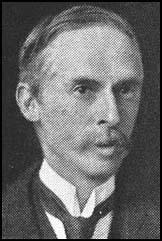J. A. Hobson

John Atkinson Hobson, the son of William Hobson, the owner of the Derbyshire & North Staffordshire Advertiser, and Josephine Atkinson, was born in Derby on 6th July 1858. He studied at Derby Grammar School and Lincoln College, Oxford, and afterwards taught classics and English literature at schools in Faversham and Exeter.
In 1887 Hobson moved to London where he met the journalist William Clarke, who invited him to join the Fabian Society. An active member he wrote two books for the organization, Problems of Poverty (1891) and Problem of the Unemployed (1896). Other books published during this period included the Evolution of Modern Capitalism (1894) and John Ruskin: Social Reformer (1898).
C. P. Scott, the editor of the Manchester Guardian, recruited Hobson to be the newspaper's correspondent in South Africa. While reporting on the country he developed the idea that imperialism was the direct result of the expanding forces of modern capitalism. Soon after returning to England in 1900 Hobson went on a lecture tour of the country. A strong opponent of the Boer War, Hobson condemned it as a "conflict orchestrated by and fought for the preservation of finance capitalism at the expense of the working class."
Over the next few years Hobson published several books exploring the links between imperialism and international conflict. This included War in South Africa (1900) and Psychology of Jingoism (1901). In his book Imperialism (1902), Hobson argued that imperial expansion was driven by a search for new markets and opportunities for investment overseas. These three books helped Hobson obtain an international reputation and influenced political figures such as Lenin and Trotsky.
Hobson continued to write for the Manchester Guardian and his relationship with C. P. Scott became even closer after the editor's son, Edward Scott, married Hobson's daughter, Mabel. Hobson also contributed to journals such as the English Review, the Independent Journal and the Nation.
In his book The Industrial System (1909), Hobson argued that maldistribution of income led, through oversaving and underconsumption, to unemployment and that the remedy lay in eradicating the "surplus" by the redistribution of income through taxation and the nationalization of monopolies. Some have argued that David Lloyd George was influenced by this ideas and this was reflected in his People's Budget of 1909.
Hobson was opposed to Britain's involvement in the First World War and in 1914 joined the Union of Democratic Control, and served on its executive council. In his book Towards International Government (1914) he advocated the formation of a world body to prevent wars. However, he was highly critical of the League of Nations, as he believed it was little more than a "New Holy Alliance of the victors". He was also a savage critic of the Versailles Treaty.
In 1919 Hobson joined the Independent Labour Party. He wrote for socialist publications such as the New Leader, the Socialist Review and the New Statesman. A socialist, Hobson rejected the theories of Karl Marx and favoured the reform of capitalism rather than a communist revolution. A severe critic of the Labour Government formed by Ramsay MacDonald in 1929, Hobson rejected the offer of a peerage in 1931.
Hobson's autobiography, Confessions of an Economic Heretic, was published in 1938. He wrote his last article for the New Statesman in December 1939 where he expressed the hope that America would join the war, which he believed would shorten the conflict. John Atkinson Hobson died on 1st April, 1940.
Primary Sources
(1) Margaret Cole became a Socialist after reading J. A. Hobson's The Science of Wealth.
I slipped into Socialism - the non-dogmatic, idealistic English Socialism of the early twentieth century - as easily as a duck slips into water. The first step in my conversion was a little book called The Science of Wealth, by that generous, profound, and long-neglected thinker, J. A. Hobson. It was a book on economics, not Socialism; but when I read in it the statement, almost causually thrown out, that a certain number of unemployed without wages, living in the last resort on charity and the Poor Law, were a necessary condition of capitalist industry, I was outraged. It must be remembered that in 1911 there was no State unemployment insurance at all; long spells of sickness or unemployment did mean recourse to the Poor Law, and "the workhouse" was pretty real to anyone who knew anything of nineteenth-century popular literature.
